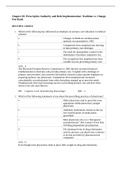Tentamen (uitwerkingen)
Advanced Pharmacology test bank all questions and answers
- Vak
- Instelling
Prescriptive Authority and Role Implementation: Tradition vs. Change Test Bank MULTIPLE CHOICE 1. Which of the following has influenced an emphasis on primary care education in medical schools? a. Changes in Medicare reimbursement methods recommended in 1992 b. Competition from nonphysicia...
[Meer zien]



